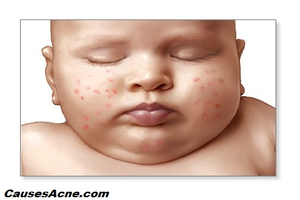
Hormonal acne is a type of acne caused by an increased production of skin oil (sebum) due to overactive hormones. It can be found on nearly all parts of the body but is most common in areas where there is a dense grouping of sebaceous glands (the glands that produce oil) such as on the face, neck, back, shoulders, upper arms and chest. Although it is most often associated with teenagers, hormonal acne can also be found in adults.
Causes of Hormonal Acne
There can be many reasons why a person develops acne. In the case of hormonal acne, as the name suggests, abnormally high levels of hormones such as testosterone and estrogen are responsible for an increase in sebum production. This means that the body is producing more oil than normal and this can easily result in clogged pores. The bacteria trapped under these clogs thrive and quickly multiply which in turn inflames your pore, causing it to become red, tender and swollen.
During puberty, teenagers experience an increase in hormones as their bodies mature. Both males and females are affected by this influx and the resulting acne can sometimes be very difficult to control.
Adults who are afflicted with diseases that cause hormones to become irregular such as polycystic ovarian syndrome (PCOS) can also be affected by hormonal acne.
Sickness, lack of sleep, stress and weather changes have also been found to contribute or cause hormonal acne in both teenagers and adults by increasing the normal production of sebum.
Pregnancy and menopause are also guilty of sometimes causing unusual breakouts of acne due to increased hormones, even if the women’s skin is normally clear.
Symptoms of Hormonal Acne
Hormonal acne mimics typical acne lesions such as pimples, blackheads, whiteheads, blemishes and the classic zit. A person’s skin may be described as oily and have a pronounced shine to it.
Treatments for Hormonal Acne
Luckily, there are multiple treatments for hormonal acne. For both males and females, targeting the excess oil that is clogging their pores usually works to clear their acne. There are many facial cleansers and body washes on the market that are geared towards reducing the sebum that has built up on your skin. Unfortunately, some of these products contain harsh ingredients which can further irritate the skin.
For women, their physician may sometimes prescribe birth control pills to aid in keeping their hormone levels (and subsequent sebum production) consistent. Women may also prefer to purchase non-comedogenic (doesn’t clog pores) makeup and both sexes may benefit from a non-comedogenic moisturizer to limit the chances of a pore becoming blocked and forming a blemish.
There are also quite a bit of companies marketing natural hormones derived from plants to regulate your own hormones in order to eliminate acne. Dr. Lawrence E. Gibson from mayoclinic.com states that the problem with this is that plant hormones has a different structure than animal hormones, therefore, the effects of these pills may be extremely limited.
In some cases, the assistance of an endocrinologist (hormone doctor) may be sought to check an individual’s hormone levels. These specialists can investigate the findings and may be able to help regulate your hormones. A dermatologist may also be consulted and may offer over the counter or prescription treatments for your acne.
Although hormonal acne is not reliant on bad hygiene, reducing impurities such as excess oil, dirt and sweat on your face and body can lessen the chance of breaking out. Doing simple things such as showering after exercise, keeping your hands off your face, wearing clean clothes composed of breathable fibers and frequently washing your pillow cases and sheets can help reduce transferred oil and skin cells will result in your pores clogging less often.
Lastly, don’t stress out about your hormonal acne. As mentioned, stress can result in an overabundance of sebum production which increases the chances of forming pimples. Just keep things clean, relax, get sleep, eat well and find a face wash that works for you. By doing these things you can greatly reduce or even eliminate your hormonal acne.
